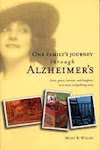There was something about Christmas at the Kunkel house that was really wonderful. We were always close as a family, so that was special. Even during those years when the money was scarce, it was still there—so it was not the gift giving.

I suppose it was because my Dad, Mr.Sawdust, grew up as an only child that Christmas among his seven children became such a special day to him. In fact, I believe his experience as an only child had much to do with his desire to have a large family in the first place. He reveled in the day, surrounded by his children, and as we got older he seemed to love it even more. He would greet us at the door delighted beyond words. And as each new grandchild was added, his pleasure only increased.
Growing up in a home with such creative, imaginative brothers, there was often a surprise; a gift that was kept hidden until the very end of our gift giving. It would be hidden in a corner, covered by a sheet, and finally unveiled; a painting, a refinished piece of furniture, something that had been given much thought and time in preparation for the day.
Christmas has never been quite the same since Dad died in April of ’97. We’ve all missed his excitement and I have especially missed his hidden surprises. Last year the day passed once again and I contented myself with those fond memories of Christmas past.
But to my delight there was a wonderful surprise in store for me, “unveiled” after the decorations had been taken down and the tree had been dragged out to the woods behind our home. My brother Jeff called and asked if I would be willing to “baby-sit.” Jeff is a bachelor—no children—so this was an unusual request.
He drove to our home in the Pocono Mountains of Pennsylvania and unveiled a very familiar piece of furniture—one I had grown up with—a maple Lazy Susan table built by my dad in 1951, the year I was born. It was one of the very first pieces he ever built. My mom tells of the weekend her relatives were visiting from New York City, and Dad had his first “audience” down in the basement, mesmerized as he cut out the circle for the table top that measured close to sixteen feet in circumference. Jeff asked if I would mind “babysitting” the table until he had a place big enough to use it again. I was delighted! Yet, I had no idea at that moment just how delightful this experience was going to be.
I insisted Jeff stay for dinner—the first meal served at the table in many years, and with each turn of the Lazy Susan, the memories came alive. I could almost envision my dad seated with us, at “the head,”—if there can be a head at a round table.
“Father we thank thee for all the blessings we continue to receive
Our health, our home and all our loved ones.
Keep us safely through the night
And help us to judge wisely in all we undertake,
In Jesus name we ask thee….Amen”
Although he always recited the same prayer, his tone of voice varied; most of the time strong and confident, at other times hesitant and humble as if really pondering his blessings.
I think Dad had great foresight when he built it, because it would eventually seat seven children, Dad and Mom—comfortably. That is, as comfortable as one could expect to feel seated at table with seven hungry children ranging from age twelve down to one.

The Lazy Susan in the 1950’s, in our home in Morristown NJ
All of the food was placed on the attached Lazy Susan at the center of the table and each person would turn it to help himself to a serving of the food he wanted. At times a rambunctious little boy (…notice I didn't say girl) would give it a sharp turn and spill the gravy or hit someone's glass of milk set too close to it and we'd have a mop-up operation. That never went over real big with Dad. What I recall most, though, is how difficult it was to get a word in edgewise. I would finally resort to standing up and yelling above the conversations of my six brothers to finally get to add my two cents. That didn't go over too well either. Dad would quickly tell me to get my voice down and sit down. When Dad spoke, everyone listened. No one left the table without a polite, "May I please be excused?"
… I don't think I ever did get to say my piece.
As I sit at the table now, so many years later, my mind goes back to the numerous homes that have housed it. From it’s original home—its birthplace in South Orange, New Jersey it was moved to my parents’ dream house in Morristown, New Jersey—a ten room colonial built by my dad in the 1950’s. I remember my baby brother Carl giggling as he was spun around on the Lazy Susan seated in a big wooden bowl. From there it was moved eight years later, along with the family to Lancaster Pennsylvania where the Kunkel family experienced the hardest year of their life as a family. But the Lord always graciously provided meals to be served around the Lazy Susan table—and we stayed close as a family.
From Lancaster the table was moved to Montclair, New Jersey and then to Upper Montclair. Now close to my mother’s Italian family from the Bronx in York city I remember with delight the fabulous Italians meals we enjoyed many weekends, seated around the table for hours—the conversation and stories that were passed on I remember to this day.
Then on to our adventure in , Texas for several years, and back to Morris Plains, New Jersey—then on to Hackettstown where my dad founded a company that worked with Plexi-glass—imagine that! The table moved to Long Valley, New Jersey but was too large for the dining area so spent a year in storage until our next move to a larger home in Hackettstown, New Jersey.
“Happy Birthday” must have been sung hundreds of times when all the grandchildren are included—the tune becoming more of a barber shop quartet arrangement as the circle grew and voices deepened through the years.
There were many times that the Lazy Susan was removed from the center of the table so dad could work on a project; a model airplane, a presentation or perhaps a complex genealogy chart—as mom patiently stood by.
Plans were made among my dad and six brothers…business ventures developed…furniture designs discussed…politics avoided…a woodworking school was conceived…holidays celebrated….all around this wonderful Lazy Susan table—throughout a time span of over fifty years.
And it is more beautiful, mellow now than ever. Dad would be thrilled to see it sitting in a dining room once again, ready to serve more memories.

Lazy Susan at its “babysitter’s” home in the Pocono Mountains of PA.
As I sit writing at the table, just as my father did on so many nights—alone, yet amidst the company of so many warm memories—all I can say is…
“Thanks Dad!”
Mary B.Walsh
(Mamie-only daughter of Mr. Sawdust)
For more Mamie memories visit...
Dearbabyboomer.com








